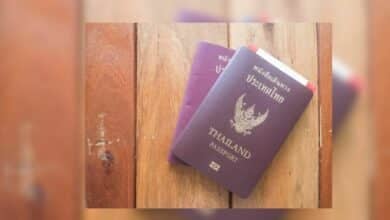Thailand single visa plan and Its impact on Indian travellers

Planning a trip to Thailand? There’s something you need to know. Thailand’s government has rolled out a new entry requirement for foreign travellers – a travel insurance policy with Covid coverage. This move is designed to ensure that visitors can cover any medical costs or treatments that might accrue should they test positive for Covid during their stay.
For Indian travellers, this new policy could have significant implications. While travel insurance for Thailand isn’t compulsory for Indians, it’s now a crucial part of the travel checklist. This insurance doesn’t just safeguard against potential health emergencies but also covers financial losses like lost baggage or trip curtailment.
So, whether you’re planning to soak up the sun on Krabi’s stunning beaches or explore the limestone cliffs of Phi Phi Island, it’s vital to understand the impact of this single visa plan. Let’s delve into the details.
Overview of Thailand’s single visa plan
Thailand, renowned for its stunning landscapes and vibrant culture, has introduced a new proposal to streamline entry for foreign travellers. This initiative, known as the single visa plan, boasts significant advantages which we’re about to explore.
The basics of the single visa plan
Understandably, Thailand’s single visa plan holds the utmost significance for prospective tourists. Firstly, the mandate generalises the consent period: the visa processing time at the Consulate rests at 3 business days for centres in Chennai and 4 business days for centres elsewhere. Visa-free entry, currently under consideration, offers promising benefits notably for Chinese visitors, with the possibility of extending this boon to other nationalities.
A significant attribute of the plan is the introduction of a fee, 2000 THB, payable upon arrival in cash and exclusively in Thai currency. The fee, however, retains the prerogative to fluctuate without prior notification. A stringent feature, indeed, but its rewards are manifold.
Also, a strong push towards safety and security measures aims to revive and fortify trust, particularly among Chinese tourists. Positive content and tourism information shared through prominent tech and online players, such as Huawei Technologies, and Trip.com Group, targets debunking misconceptions, thereby assuring a safe travel environment.
How the single visa plan affects Indian travellers
The single visa plan’s impact on Indian travellers charts mixed territories. One area of concern is the compulsory Thai currency requirement for the entry fee. However, Indian tourists, often travelling with families, represent an attractive prospect for the Thai hospitality sector, with their tendency towards good expenditures.
Furthermore, as travel insurance isn’t a prerequisite for Indian tourists visiting Thailand, the new visa mandates, therefore, bolster protection against potential financial emergencies such as loss of baggage, medical emergencies, or other unwelcome surprises. Enhanced protection makes the plan increasingly appealing, leaving Indian tourists free to embrace the unique beauty of destinations like Krabi and its well-known beaches and limestone cliffs.
Benefits of the single visa plan for Indians

Thailand’s innovative single visa plan offers numerous merits, notably for Indians considering an excursion to this bizarre region.
Ease of travel and reduced paperwork
Imagine walking into an airport, passport in hand, your mind at ease knowing the visa procedure is streamlined. That’s the magic of Thailand’s single visa plan. This plan eliminates the convoluted documentation generally associated with visa application procedures. Visa processing time standardisation substantially simplifies the overall traveller’s experience. The transition towards a digital platform implies you’re likely to pack your bags and fly sooner rather than later. For Indians who value firm time management, this is truly advantageous.
Extended stay and tourism opportunities
Thailand, famously recognised as the ‘Land of Smiles’, captivates visitors with its thriving culture, vibrating nightlife, stunning landscapes, and delicious food. Now, thanks to the single visa plan, Indian tourists get the liberty to immerse themselves in these experiences for an extended period. Essentially, it augments visitor’s stay span, allowing you a fair share of the region’s rich heritage, contemporary city life, and majestic beaches. Furthermore, the prolonged stay benefits businesses linked to the tourism sector, supporting Thailand’s economy.
Challenges and considerations
As you delve into the details of Thailand’s Single Visa Plan, it’s necessary to consider the possible challenges and potential impact it may hold for long-term Indian expats residing in Thailand. While the plan looks promising, it’s important to recognise the potential hurdles and understand the implications for different individuals.
Possible delays and processing times
Despite the optimistic outlook, it’s understandable that the introduction of the Thailand Single Visa Plan might suffer from certain teething problems. One major consideration could be possible delays in visa processing times. Despite intentions for standardised visa processing, initial stages might face hiccups.
Vast application volumes, any necessary adjustments to new procedures, or dealing with unique visa cases could slow down the rate of visa issuance in the beginning. This may cause significant inconvenience, particularly for individuals planning to travel on a tight schedule. So, if you’ve planned your Thai vacation, it’s better to account for these potential delays to avoid disruptions to your itinerary.
Impact on long-term Indian ex-pats in Thailand
In regards to the long-term Indian expatriates currently residing in Thailand, the Single Visa Plan can present unique challenges. With the introduction of a new entry fee and mandatory travel insurance with Covid coverage, expatriates may face increased costs of living.
However, not all changes may be detrimental. The plan’s focus on streamlined processing and insurance coverage could greatly enhance legal security for expats. Enhanced tourism partnerships may also provide employment or business opportunities within Thai tourism and related sectors. Nevertheless, Indian expats must evaluate and understand these changes to navigate through the impacts of the Thailand Single Visa Plan efficiently.
How to prepare for travel under the single visa plan

A new era of travel between India and Thailand is dawning with the introduction of the Thailand Single Visa Plan. Understand the plan’s impact on Indian travellers to ensure a smooth, stress-free experience.
Required documentation for Indian travellers
Firstly, get your documents in order. Typical requirements with the Thailand Single Visa Plan include a passport with at least six months remaining validity, financial proof qualifying you as solvent during the stay, and a complete application. Details depend on whether you’re applying for a Single-entry Non-Immigrant Visa, valid for 90 days, or a Multiple-entry Non-Immigrant Visa permitting stays of 90 days per visit within a year.
Individuals from specific countries, including India, face requests to lodge their application in person at their resident Thai Embassy. Submissions lack consistency in obligations and appropriate intent exclusivity in the form. Embassy officers may ask for supplementary paperwork as required. Failure to provide necessary documents warrants a letter explaining the lack. Signatures are required on every page of the copied documentation.
Health and safety regulations
Abiding by health and safety protocols is crucial too. Firstly consider a robust travel insurance plan, not mandatory for Thailand from India, but strongly advisable. With Tata AIG’s international travel insurance, safeguard yourself against potential monetary emergencies such as medical emergencies, loss of baggage, and trip interruptions.
Also, be prepared for the Thai authorities to push safety and security upgrades targeting the revival of tourism from specific markets. In association with partners like Huawei Technologies, Trip.com Group, Meituan.com, Spring Airlines, Sina News, Alipay, iQIYI, and Jego Trip, the Thailand government aims to counteract incorrect information and promote a positive perception of safe travel within the country.
Economic impact on Thailand and India

Following the Thailand Single Visa plan‘s roll-out, it’s time to assess the potential economic implications for both Thailand and India. Discussed under two primary subheadings, we’ll delve into how this travel plan might boost tourism revenue and enhance bilateral relations.
Boost in tourism-related revenue
Thailand’s Single Visa Plan could offer a significant spike in tourism earnings for both countries. Thailand, already famed for its beautiful locations like Krabi, might witness a rise in Indian tourists, attracted by less cumbersome travel arrangements. For instance, adventure seekers might find the limestone cliffs of Krabi or the Phi Phi Island tour more feasible options due to the simplified visa process.
On the other hand, Indian tourism might also experience a positive impact. A simplified visa process could attract Thai tourists to the rich Indian culture and distinctive landmarks. Tourism-related businesses such as travel insurance providers like Tata AIG already offer plans accommodating the new travel policies. Consequently, the ripple effects of this travel arrangement could potentially benefit various sectors and boost the overall economy of both countries.
Enhancements in bilateral relations
Apart from boosting tourism revenue, the Thailand Single Visa Plan is also likely to strengthen ties between India and Thailand in other areas. Facilitating people-to-people contacts, this plan could lead to greater mutual understanding, fostering stronger diplomatic relations. On a commercial level, this plan might facilitate better cross-border trade, allowing businesses to effectively tap into the markets of both countries. This can lead to more business opportunities, and therefore, an enhanced bilateral economic partnership.
Moreover, the Thailand Single Visa Plan exemplifies the spirit of cooperation and mutual growth between India and Thailand. With an emphasis on safety, as highlighted by TAT governor Thapanee Kiatphaibool, it also reassures travellers, further cementing trustful relations between the two nations. Therefore, such a plan is not just about easing travel, but it’s also part of a larger, strategic plan to fortify ties on multiple fronts.
In the context of a Thailand visa, “void” means that the visa is no longer valid for entry or stay in the country. This could be due to various reasons such as expiration, cancellation, or violation of visa conditions. Travellers must ensure their visas are valid to avoid any entry issues.

































